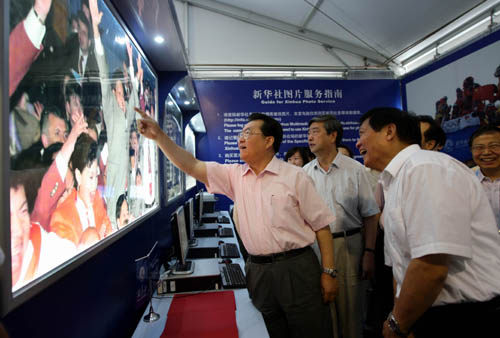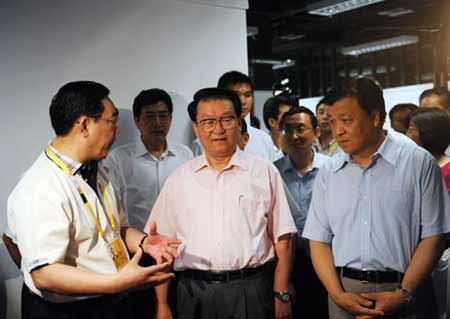
Senior leader Li Changchun(center) inspects the 2008 Beijing International Media Center (BIMC) on Thursday, July 10, 2008.
Foreign journalists should complain formally if they have any problems in doing their jobs during the Beijing Olympic Games, senior Chinese leader Li Changchun said on Thursday.
While visiting the Beijing International Media Center (BIMC), which opened on Tuesday to serve more than 5,000 non-accredited reporters during the Games, he said officials would effectively implement regulations that ensured foreign journalists would be allowed the freedom to report.
"If you are dissatisfied, you can file your complaint directly to Liu Qi, president of Beijing Organizing Committee for the Games of XXIX Olympiad," he told reporters. Liu accompanied Li around the media center, one of the three major news centers of the Beijing Games.

Senior leader Li Changchun(center) inspects the 2008 Beijing International Media Center (BIMC) on Thursday, July 10, 2008.
Li, a member of the Standing Committee of the Political Bureau of the Communist Party of China Central Committee, welcomed all foreign journalists to the country for the Olympics, saying, "I hope you could truly and fully cover the event and tell the world (about) a true China."
He said the center could provide broadcast transmissions around-the-clock. He promised to ensure the security of transmissions, a major concern of overseas journalists, and asked the staff to strengthen security measures.
Answering a question from an Aljazeera reporter, he said China was fully capable of ensuring the security of the Games from Aug. 8 to 24.
Juan Rosso of Colombia's Caracol Radio was satisfied with the service at the center. He told Li that the technology here was perfect, convenient and advanced.
"Colombian people need to know more about China as more Colombian entrepreneurs have come to China to invest, or look for options," he said.
Rosso said during the Games their reporting would also focus on China's economy, culture, history, tourism, entertainment and lifestyle.
Li's visit to the media center was to examine the work there so as to ensure that domestic and foreign reporters enjoyed quality service during the Games.
Andrew Kirillov, Beijing bureau chief of the Russian Itar-Tass News Agency, said the visit to the media center by a senior Chinese leader demonstrated the central government's strong support of the Games.
He said the center was very convenient except parking problems. "Our work will be ultimately judged by all reporters," Li said.
Located two kilometers away from the Main Press Center, the BIMC is the home for journalists who do not have Olympic media accreditation.
The BIMC will host two or three press conferences a day about environment protection, security, traffic, among others.
The center is a newly-decorated hotel that covers an area of 60,000 square meters. It has three working areas, two press conference halls, an exhibition area and a catering area. Above the fourth floor are guest rooms that are only open to journalists during the Games.
The opening of the BIMC, together with the Main Press Center (MPC) and International Broadcasting Center (IBC) of the Olympic Games on Tuesday, kicked off the media service for the event. More than 20,000 reporters will cover the Games.
On Jan. 1, 2007, regulations on foreign journalists' reporting activities in China during the Beijing Olympics took effect. Under the new rule, foreign journalists no longer have to be accompanied or assisted by a Chinese official when they report in the country.
They also no longer need to apply to provincial foreign affairs offices for permission to report in all of the country's provinces, autonomous regions and municipalities.
(Xinhua News Agency July 11, 2008)